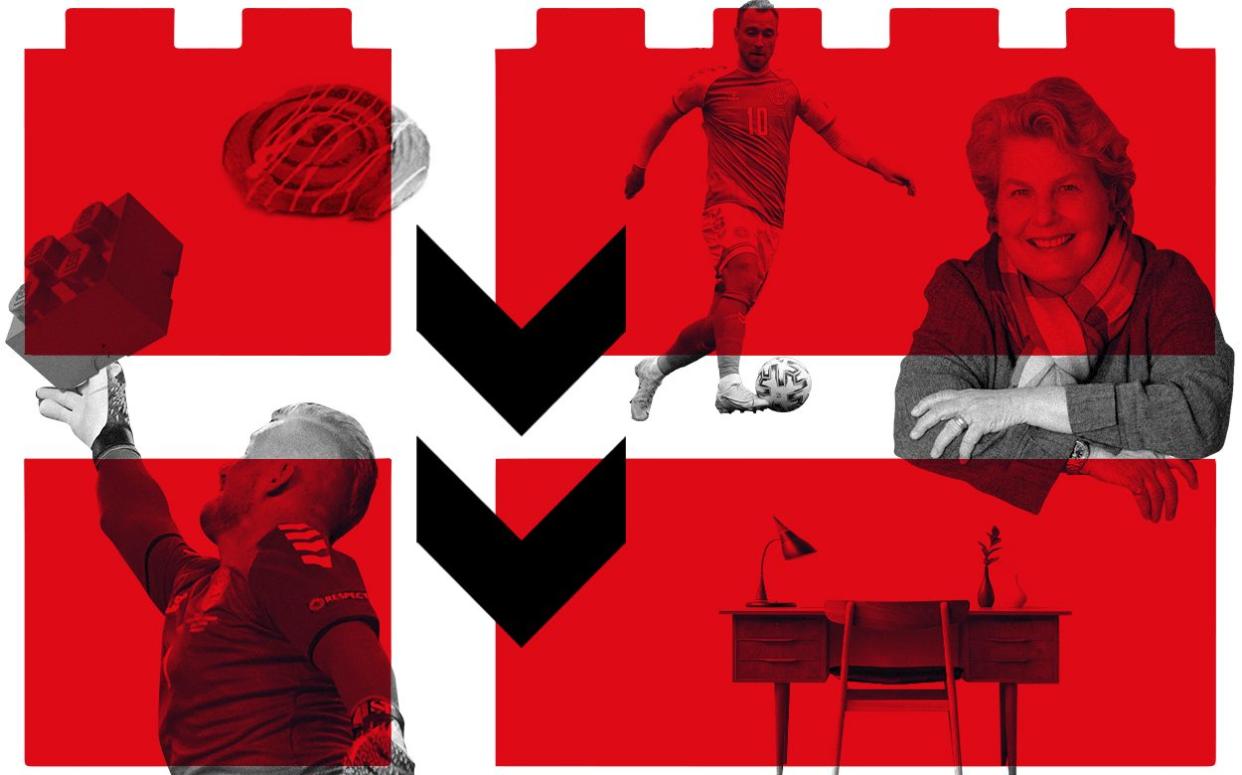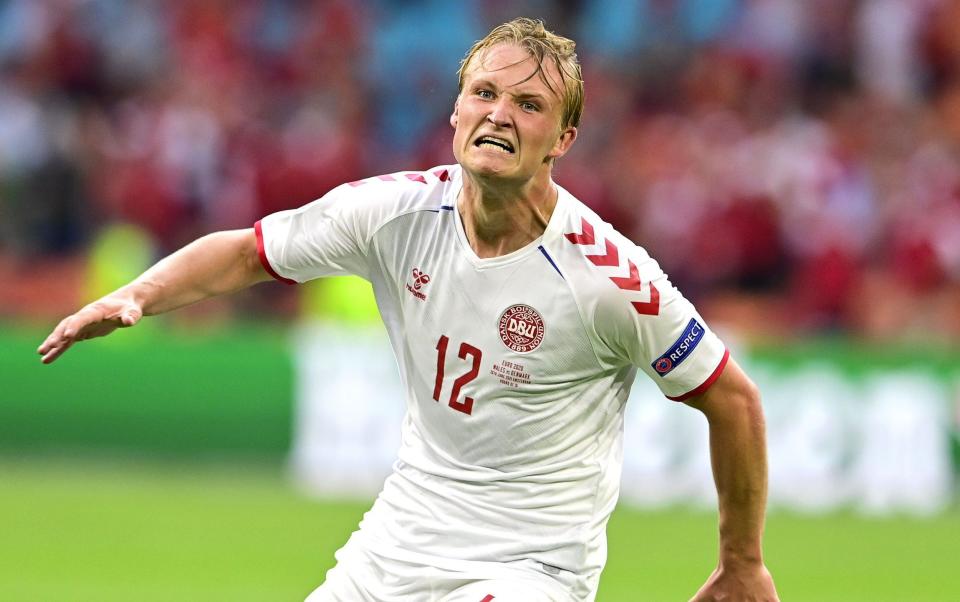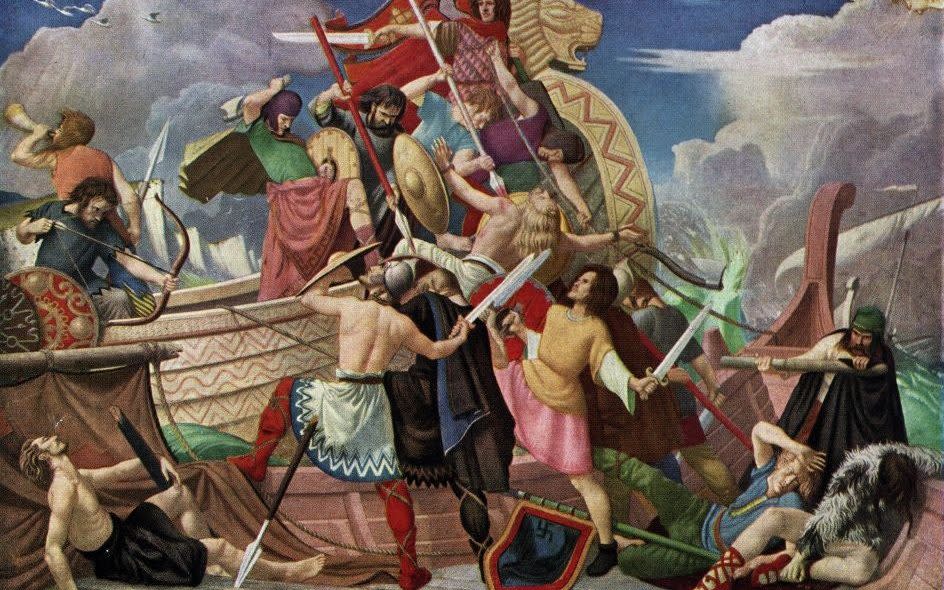Win or lose, here’s why we’ll always love the Danes

- Oops!Something went wrong.Please try again later.
- Oops!Something went wrong.Please try again later.
- Oops!Something went wrong.Please try again later.
It’s normally so easy to despise whoever’s playing England. Dredge up some hackneyed national stereotypes, over-inflate the sporting rivalry, irresponsibly invoke historical events that were objectively tragic… done.
Not so today. Because how, out of interest, might you trash talk the Danes? “Oh, Hans Christian Andersen’s been quiet lately… Run out of ideas about small magical things, has he?”... “Oi! Mads Mikkelsen? You’re just a s*** Julian Sands, s*** Julian Saa-aands”... “Hygge? Simple pleasures and cosiness are for t****, Klaus”... “QI’s been unwatchable since Toksvig took over from Stephen Fry, and you all know it”...“Lego? Proper kids play with Airfix, mate”... “Cnut the Great? More like…” Etcetera.
There’s not a lot to go on. The truth – difficult as it is to swallow on a day when we are, to quote a lot of people on Twitter, intending on having “Danish for breakfast” – is that if it weren’t for the inconvenience of their football team standing between England and the Euro 2020 final, we’d all be supporting Denmark.
Even before the collapse of Christian Eriksen in the first round, the emotion of which does battle tonight with the intensity of feeling we all have for Gareth Southgate, all the neutrals on the planet would be on the Danes’ side. Everything, from their underdog status to their exports, their inoffensive good looks to their general way of life, makes it so.
You can try and hate them; you can even try and mildly dislike them; but you won’t win. And if England also lose this evening, it won’t matter (it will, it will matter) because deep down, we all love the Danes. Now, let us count the ways.
1. Their work culture

It might surprise you, when you see the energy levels of Pierre-Emile Hojbjerg as he goes box to box this evening, but the Danish workrate is stately. A “full-time” working week in Denmark is typically 37 hours – 5.5 hours fewer than here in the UK. Do they feel like slackers, though? The opposite: in Denmark working overtime is seen as a weakness, in that if you can’t get your work done in the allotted hours, it’s your fault for invading your own free time.
The working day in Denmark tends to finish at around 4pm, and full-time workers are guaranteed five weeks of holiday, regardless of position or industry. And they take it all. To not do so is seen as mad. Little wonder Denmark is frequently jostling with its Scandinavian neighbours in the ranking of the world’s happiest countries.
2. The rest of their lives
Work is just one thing. Despite what The Killing might suggest, Denmark also has half the crime levels of the UK. University tuition is free for all, including the rest of the EU. No country in the world is less corrupt, and no country in the world has a higher minimum wage ($44,252).
Why don’t we all just move there?
3. Breakfast
Take away bacon and Danish pastries. What are we left with at breakfast? Quite a lot, admittedly, like croissants and eggs and stuff, but you have to admit that life would be worse were it not for Denmark’s contribution to the most important meal of the day.
4. Lego

Be honest – without Lego, what would your child have done between the ages of four and eight? Get into hard drugs and street crime, that’s what. Lego is the literal building blocks of a good start to life, and we have the Danes to thank for it.
5. The Little Mermaid, The Princess and the Pea, The Ugly Duckling, The Emperor’s New Clothes, Thumbelina…
All absolute floor-fillers from the banger-writer-in-chief, Hans Christian Andersen. I refer you back to Lego: your kids (or just you) would simply be in prison without Andersen teaching them important lessons about mattress thickness, being honest with someone when they’re naked, and how if you’re unattractive in your youth you’ll definitely be beautiful in adulthood.
6. Kasper Schmeichel
🗣 'What would it mean to you guys to stop it 'coming home' tomorrow night?'
'Has it ever been home? Have you ever won it?'
Kasper Schmeichel went there 💥#ENGDEN | #ITVFootball | #Euro2020 pic.twitter.com/X4x2SQDyyq— ITV Football (@itvfootball) July 6, 2021
Criticised today for rattling England fans with his, “Has [football] ever been home?” comments in a press conference, the Danish goalkeeper is otherwise an exemplary bloke who is impossible to dislike.
He’s Leicester City’s hero and captain. He was one of the first on the scene for both the tragic helicopter crash that killed five people, including Leicester’s owner, in 2018, and Christian Eriksen’s collapse. He’s incredibly good looking. He looks Viking but sounds delightfully Mancunian, like his dad. He’s only really become good in the final years of his career. What’s not to admire about big Kas?
7. That Hummel football kit

Nice, isn’t it? Simple, clean, traditional, classy – Denmark in a nutshell. The only other kit manufacturers left in the tournament are Nike and Adidas, the giants of sports. Hummel, a Danish company whose name means “bumblebee” in German and who invented the football boot, is punching well above its weight and winning.
And look at those downward arrows on the shoulders! Like the little tear-off strip on an Amazon parcel. Great, great stuff.
8. The furniture
The Scandi takeover of British culture has seen them do noirish crime dramas better (though, weirdly, Midsomer Murders is massively popular there, so really we trade them), rebrand the very concept of cosiness, and perhaps above all, redesign our front rooms.
Like Swedish and Norwegian, it’s all soft hues, minimal fixtures, clean lines, and lots of bare wood. Clutter, either of the literal or mental kind, is not welcome. Natural elements abound. Light is welcomed in. Rooms look modern, inviting and understated in a thoughtful way, you know?
We all want a Danish-looking home, just as we all secretly want to be Danish. England could, and perhaps should, win tonight. But if they end up losing, we know who we’re supporting in the final. After all, don’t get us started on the Italians...
We may love the Danes now, but it hasn’t always been like this...
Historian Dominic Selwood explains why hostility between England and Denmark stretches back thousands of years – and eclipses our rivalry with the Germans

The battle tonight at Wemba’s leah (an Anglo-Saxon first name, and the word for a forest clearing) is between two peoples with an unusually close historical affiliation.
Prehistoric Britain began around 950,000 BC, when nomadic hunters wandered onto a peninsula jutting into the North Sea off the coast of the European continent. These nomads came and went for millennia, approaching from the areas that are now Denmark, Germany and the Netherlands. So – excusing the anachronism – the peoples of England and Denmark go back a very long way.
Populations came and went. The peninsula separated into the islands of Britain and Ireland. Farmers and warriors tilled the soil and fought tribal battles until eventually the Romans withdrew in the early AD 400s, leaving England vulnerable to attack. The adventurous people who exploited this power vacuum and arrived with “blood-red blades” are usually called Anglo-Saxons, but were actually a mix of Angles, Franks, Frisians, Jutes and Saxons. Of these, the Angles and Jutes were spread over what is today Denmark. And the Angles gave the new country their name: Angle-land (England). So Wemba – whoever he was – may well have had Danish forebears.
In AD 789, the Anglo-Saxon Chronicle records the appearance off Weymouth of “the first ships of Danish men which came to the land of the English”. They slew the king’s reeve who rode out to meet them, then left. Six years later, fiery dragons scorched the sky over Northumberland, and the Danes returned. This time they sacked Holy Island and the serene abbey of Lindisfarne, pillaging, murdering and enslaving. The Vikings had arrived.
Viking is not an ethnonym. In Old Norse it means someone going off on a raid. The Anglo-Saxons often simply called them Danes, although they came from all across Scandinavia. They set about conquering England, eventually capturing it all save for King Ælfred’s kingdom of Wessex. After a showdown at the Battle of Edington in AD 878, Ælfred and the English kept everything south of a line running from Liverpool to Rochester, while the Vikings took the rest in a permanent colony known as the Danelaw.
The wars continued. King Æthelstan of Wessex managed to forge the kingdom and crown of England in AD 927, but it all fell apart when King Æthelred II “the Unræd” (ill-advised) ordered the slaughter of all Danes in England on St Brice’s Day 1002. Viking retribution intensified until 1013, when Swein Haraldsson “Forkbeard”, king of Denmark, invaded and took the English throne, welding England into a North Sea Scandinavian empire.
Two Anglo-Saxon kings reigned for short periods, but it was the turn of the Danes: Kings Cnut “the Great”, Harold I “Harefoot” and Harthacnut. In this time, the language at the English court was Old Norse, and the Trinity was replaced – as it had been by the original Anglo-Saxons – with Odin the All Father, Frigg, Thor, Freya and the pantheon of anarchic Norse deities. When Duke William of Normandy conquered England in 1066, it was almost another Viking invasion, as the Normans (Northmen) were a recent Viking settlement across the Channel that had assimilated some French attributes and customs.
With the Normans and then Plantagenets at the helm, England became predominantly interested in France, and relations with Denmark eventually settled down, although not before William the Conqueror had to commission the Domesday Book to find out how much tax he could raise to pay off the Vikings and deter yet another invasion.
Considering these long centuries of rivalry, hostility and conquest, just when England was forming as a nation, the relationship between the English and Danes emerges as historically even sharper than that with the Germans, though it has involved fewer agonising penalty shootouts.
The last 1,000 years have seen amity between the two peoples – save for Britain’s navy twice shelling Copenhagen during the Napoleonic Wars. When the whistle blows this evening at full time, given so many years of rich, intermingled destiny, whichever nation is defeated the two can wish each other a heritage-rich skål!

